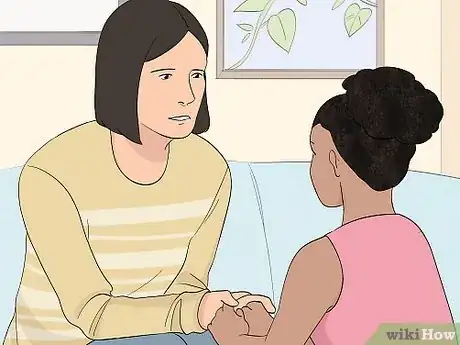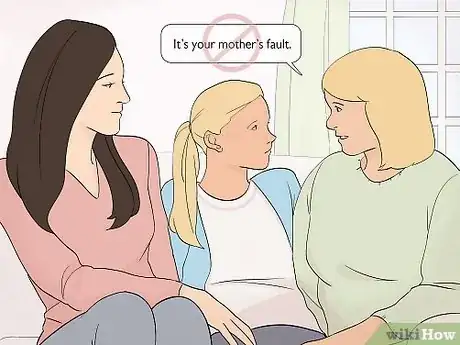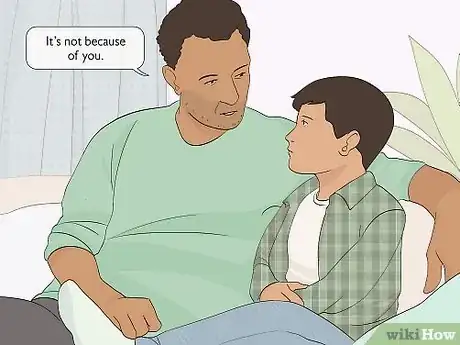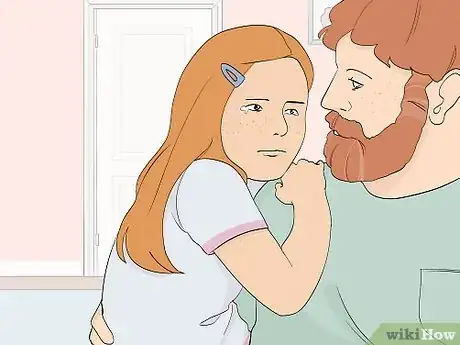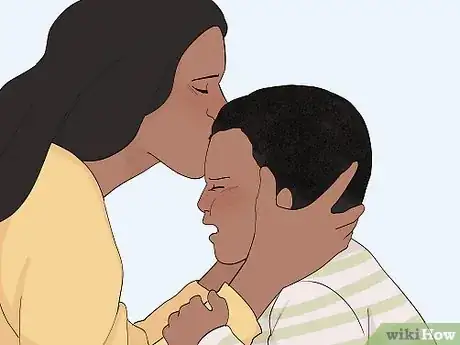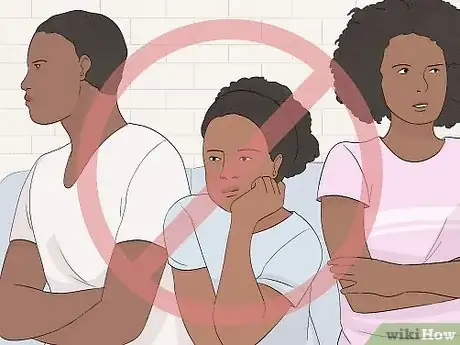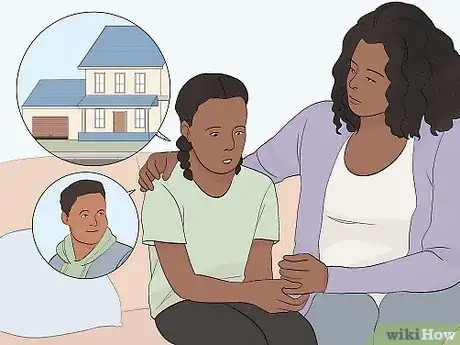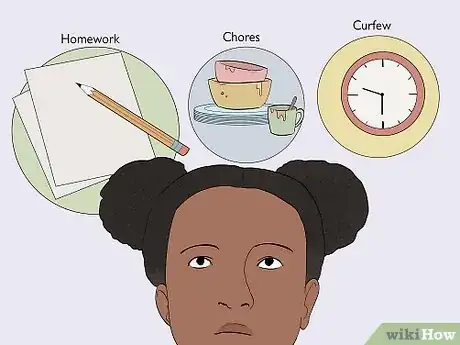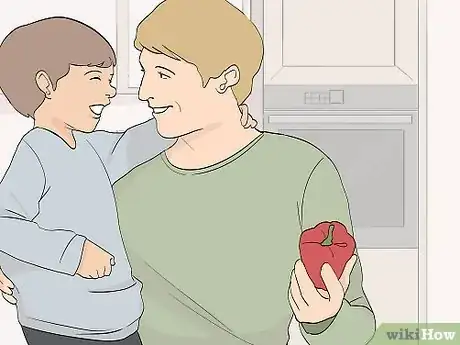This article was co-authored by Trudi Griffin, LPC, MS. Trudi Griffin is a Licensed Professional Counselor in Wisconsin specializing in Addictions and Mental Health. She provides therapy to people who struggle with addictions, mental health, and trauma in community health settings and private practice. She received her MS in Clinical Mental Health Counseling from Marquette University in 2011.
There are 12 references cited in this article, which can be found at the bottom of the page.
This article has been viewed 133,758 times.
Breaking the news of your impending divorce to your children may be one of the most difficult discussions you ever have, second only to the choice to get a divorce in the first place. Your children may react in a variety of ways: sadness, anger, or even relief. Despite this naturally being a challenging conversation, you can handle it effectively by managing your own emotions, trying to ease their concerns, and offering them support as they adjust to changes.
Steps
Breaking the News
-
1Get your own emotions in check. Your children will likely be angry and upset once you tell them about the divorce, so try not to react similarly. Wait to break the news when you can discuss the subject effectively and still be in control of your emotions. Remember, the point of the discussion is to be there for the kids—they shouldn’t have to comfort you.[1]
-
2Plan to do it together, if possible. It is best to tell the children when both parents are present, so you can present a united front. You and your spouse should decide how much you will share and who will do most of the talking. Agree about everything in advance.[2]
- If your marriage is ending due to abuse or your spouse simply will not cooperate, just plan to tell the children on your own.
- Your words can show a united front, too. Try to use “we” as much as possible instead of he, she, or I.
Advertisement -
3Select an age-appropriate explanation. The age of your kids should help guide you in what you share about the divorce. You may also want to consider the maturity and development of each of your children.[3]
- For example, to a preschooler, you might say, “Sweetie, we will be moving into separate houses. You will stay here with Mommy, but you’ll still see Daddy on weekends.”
- Slightly older children to adolescents care more about how the divorce will impact their lives. Therefore, you might want to say something like, “Mom and Dad are separating. We won’t live together anymore, but you will still be able to go to your same school. You will spend half your time with Mom and half with Dad.”
- Meanwhile, teenagers may have a much better understanding of relationships and may play a role in some of the decision-making. You might say, “We are getting a divorce. We both will continue to live in the same town, so you have a choice of who you’d like to stay with.”
-
4Provide need-to-know information only. Tell them as much as you know about how their lives will change, such as where they will live, where they will go to school, and where the dog will be. Do this without going into the messy details of why the divorce is happening. Skip any information that places blame on either parent.[4]
- If you’d like to offer a brief explanation of why you are divorcing to older kids, you might say, “Mom and Dad aren’t happy together anymore.”
- If they have questions, answer them as fully and candidly as possible without straying from your plan.
-
5Avoid using phrases that include the words "fault" or "blame." Tell them that it was a mutual decision made by the adults. If you've been arguing a lot, acknowledge that and explain that the two of you are trying to determine what is best for the family. Resist the urge to point fingers or pull the kids into the middle of adult affairs.[5]
- For instance, say, “Mom and Dad have grown apart. We are fighting a lot. It will be best if we live apart.”
-
6Have a follow-up with each individual child. It’s best to break the news as a group with all your children present. After you break the news with everyone, follow up with each child on their own.
- However, if you believe an older child’s reaction may upset any younger children, you might choose to break the news separately and tailor each response to the specific child.[6]
Reassuring the Children
-
1Tell them you love them. Perhaps the most important message you want to get across when discussing your divorce is that you still love and care for your children, even if you are the one who is leaving or moving away. Keep repeating that you love them and nothing that happens between Mom and Dad will change that.[7]
-
2Reassure them that they had nothing to do with the decision. Children may unintentionally try to shoulder the blame of their parent’s divorce, even if they don’t come out and say it. Let them know that the reason for the divorce has nothing to do with them. Reinforce the fact that they are not the problem and that the decision is made because Mom and Dad aren’t getting along.[8]
-
3Encourage them to express their feelings. Even though the decision to get a divorce is up to the parents, you should be willing to listen as your kids share their frustrations. They may cry, shout, or run away to their rooms. Anticipate a variety of reactions.[9]
- Encourage them to express how they feel by gently saying things like, "It's okay to cry, but we want you to talk to us about how you are feeling inside - what you are thinking about."
-
4Validate their feelings. When your child shares their feelings, try your best to listen to what they are saying and acknowledge their feelings. Supporting them in this way reinforces the parent-child bond and lets them know that, although things are changing, you are still there for them.[10]
- You might say things like, “I know you’re upset, sweetheart. I’m here for you.”
-
5Don’t turn your child into a confidant or pull them into the middle. Involving the child in an adult disagreement only adds confusion and distress, which may end up backfiring on you later. Both parents should agree to keep the kids out of the nasty aspects of the divorce, such as arguing or name-calling.[11]
- No matter how upset you may be about the divorce, you are there as a source of comfort for your child—not the other way around. Don’t confide in them or try to “win” them over by assassinating your ex’s character.
-
6Don’t use the kids as informants or spies against the other parent. If you are caught in the middle of a vicious custody battle, parents may search for ammunition against the other. It puts children in a difficult position to be told to lie for, spy on, or tell one parent what the other is doing. Leave your children out of it.[12]
-
7Involve them in the process as much as appropriate. Invite the kids to talk about their ideas for where they want to live. Ask them how you and your former partner can make the transition easier for them.
-
8Maintain the same rules and boundaries at both parents' homes. Agree on rules for parenting including curfews, bedtimes, homework, chores, etc. so that the rules and lifestyles are as close as possible between each parent's home. Drastic differences in parenting styles make life extremely difficult for kids who have to “learn” two ways of living.
Helping Them Adjust to the News
-
1Expect to revisit the discussion in the coming days and weeks. Once the news is out, you may need to continue the conversation with your children as new decisions are made or as they slowly process the changes. Let them know that your door is open and that you will try your best to listen and answer any questions they may have.[13]
-
2Don't promise things you can't deliver. If you don't know the facts yet on your future living situation, tell them only what you know for sure. Then, say that you are still working out some of the details. Let them know that you will tell them as soon as you know.[14]
- Never make assurances that you can’t stand behind, such as that they won’t have to change schools or that they will still see their friends every day.
-
3Alert their teachers and school administrators. Tell your children's teachers, counselors, babysitters and other caregivers, the parents of their close friends, and any other adults they see regularly about your divorce plans. Your heads up will help them to understand that any significant changes in your child's behavior may be linked to your divorce.
- Ask these adults to keep you informed of any changes in your child’s behavior or mood.
-
4Take them to see a counselor. If your child is having trouble opening up about their feelings or struggling to deal with the changes, offer to enlist the help of a counselor. This may be the counselor at their school or a mental health professional in your community.
- A counselor can be a great source of comfort and advice for children who have trouble discussing their feelings with their parents—who very well may be the cause of these feelings.
-
5Continue to have loving interactions with your kids. Your children are more likely to bounce back well after your split if you maintain a strong, nurturing bond with them. Despite the many adjustments you may be dealing with yourself, try to spend quality time with each child.[15]
- Try to maintain certain traditions or create new traditions that help all of you spend time together, such as a Sunday evening movie night or Saturday morning pancakes.
- Even if your child acts like they don’t want to spend time with you, make an attempt anyway. They may just be testing you to see how much you care.
-
6Avoid involving them in your new relationship. If either parent starts dating again soon after the divorce, your children should not be introduced to the partner until they are used to their parents being divorced. It will be difficult for the children to accept a new partner when they haven't even accepted the divorce yet.
References
- ↑ https://greatergood.berkeley.edu/article/item/emotion_coaching_one_of_the_most_important_parenting_practices_in_the_histo
- ↑ https://www.babycenter.com/0_how-to-tell-your-child-youre-getting-divorced-ages-5-to-8_3657051.bc
- ↑ https://www.todaysparent.com/family/kids-and-divorce-an-age-by-age-guide/
- ↑ https://www.psychologytoday.com/blog/all-grown/201510/how-talk-children-about-divorce
- ↑ https://psychcentral.com/lib/kids-and-divorce-ten-tough-issues/
- ↑ http://www.parents.com/parenting/divorce/children/how-to-tell-your-kids-that-you-are-getting-a-divorce/
- ↑ http://www.ahaparenting.com/parenting-tools/family-life/Divorce-protecting-kids
- ↑ https://www.babycenter.com/0_how-to-tell-your-child-youre-getting-divorced-ages-5-to-8_3657051.bc
- ↑ http://www.parents.com/parenting/divorce/children/how-to-tell-your-kids-that-you-are-getting-a-divorce/
- ↑ https://www.psychologytoday.com/blog/schlepping-through-heartbreak/201509/how-tell-the-kids-you-re-getting-divorced
- ↑ https://www.familyeducation.com/life/how-divorce-affects-children/divorce-what-tell-your-children
- ↑ https://psychcentral.com/lib/the-poison-ps-how-bitterly-divorced-parents-put-kids-in-the-middle-of-their-fight/
- ↑ http://www.goodtherapy.org/blog/how-to-tell-kids-you-are-getting-divorced-1013165
- ↑ http://www.ahaparenting.com/parenting-tools/family-life/Divorce-protecting-kids
- ↑ https://www.todaysparent.com/family/kids-and-divorce-an-age-by-age-guide/



